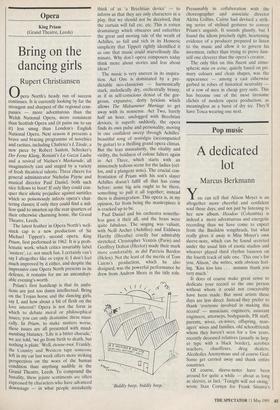Opera
King Priam (Grand Theatre, Leeds)
Bring on the dancing girls
Rupert Christiansen
Opera North's heady run of success continues. It is currently looking by far the strongest and sharpest of the regional com- panies — more adventurous than the Welsh National Opera, more consistent than Scottish Opera and (it pains me to say It) less smug than London's English National Opera. Next season it presents a brave and bracing programme of novelties and rarities, including Chabrier's L'Etoile, a new piece by Robert Saxton, Schreker's Der Perm Kiang, Rossini's La Gazza Ladra and a revival of Nielsen's Maskarade, all imaginatively cast and staged by a variety of fresh theatrical talents. Three cheers for general administrator Nicholas Payne and musical director Paul Daniel, both such nice fellows to boot! If only they could con- quer their idiotic prejudice against surtitles which so poisonously infects opera's chat- tering classes; if only they could find a mil- lion quid to smarten up the rear quarters of their otherwise charming home, the Grand Theatre, Leeds.
The latest feather in Opera North's well- stuck cap is a new production of Sir Michael Tippett's second opera, King Priam, first performed in 1962. It is # prob- lematic work, which critics invariably label 'austere', i.e. not much fun. I certainly can't say I altogether like or enjoy it; I don't feel much improved by it either, and despite the impressive case Opera North presents in its defence, it remains for me an uncomfort- able evening's-worth.
Priam's first handicap is that its ambi- tions are just too damn intellectual. Bring on the Trojan horse and the dancing girls, say I, and how about a bit of flesh on the love interest? Opera is not the form in which to debate moral or philosophical Issues; you can only dramatise them musi- cally. In Priam, to make matters worse, these issues are all presented with mind- numbing blatancy. 'Life is a bitter charade,' we are told, 'we go from birth to death, but nothing is plain.' Well, etonne-moi. Frankly, the Country and Western tape someone left in my car last week offers more striking perspectives on the woes of the human condition than anything audible in the Grand Theatre, Leeds. To compound the banality, these jejune sentiments are often expressed by characters who have advanced downstage — in what people mistakenly think of as 'a Brechtian device' — to inform us that they are only characters in a play, that we should not be deceived, that the curtain will fall etc. etc. This is rotten dramaturgy which obscures and enfeebles the great and moving tale of the wrath of Achilles, so full and rich in its Homeric simplicity that Tippett rightly identified it as one that music could marvellously illu- minate. Why don't opera composers today think more about stories and less about ideas?
The music is very uneven in its inspira- tion. Act One is dominated by a pre- dictable neo-classicism — harmonically stark, melodically dry, orchestrally brassy, as if in self-conscious denial of the gor- geous, expansive, dotty lyricism which allows The Midsummer Marriage to get away with its nonsense. Act Two, barely half an hour, unclogged with Brechtian devices, is superb: suddenly, the opera finds its own pulse and personality, moving in one confident sweep through Achilles' beautiful song of nostalgia (accompanied by guitar) to a thrilling grand opera climax. But the lean muscularity, the vitality and virility, the boldness of colour falters again in Act Three, which starts with an immensely tedious scene for the ladies (cel- los, and a plangent note). The crucial con- frontation of Priam with his son's slayer Achilles doesn't fulfil all that has come before: some big aria ought to be there, something to pull it all together; instead there is disintegration. This opera is, in my opinion, far from being the masterpiece it is cracked up to be. Paul Daniel and his orchestra nonethe- less gave it their all, and the brass were quite fabulous. The singing was valiant, with Neill Archer (Achilles) and Eiddwen Harrhy (Hecuba) cruelly but admirably stretched; Christopher Ventris (Paris) and Geoffrey Dolton (Hector) made their mark more comfortably, as did Patricia Bardon (Helen). Not the least of the merits of Tom Cairns's production, which he also designed, was the powerful performance he drew from Andrew Shore in the title role.
'Biddly beep, biddly beep.' Presumably in collaboration with the choreographer and associate director Aletta Collins, Cairns had devised a strik- ing series of stylised gestures to convey Priam's anguish. It sounds ghastly, but I found the idiom precisely right, heartening evidence of a producer prepared to listen to the music and allow it to govern his invention, rather than trying to prove him- self one cleverer than the opera's creator.
The only blot on this fluent and atmo- spheric mice en scene, quietly based on pri- mary colours and clean shapes, was the appearance — among a cast otherwise garbed in robes of historical neutrality of a row of men in cheap grey suits. This has become one of the most tiresome clichés of modern opera production, as meaningless as a burst of dry ice. They'll have Tosca wearing one next.


























































 Previous page
Previous page